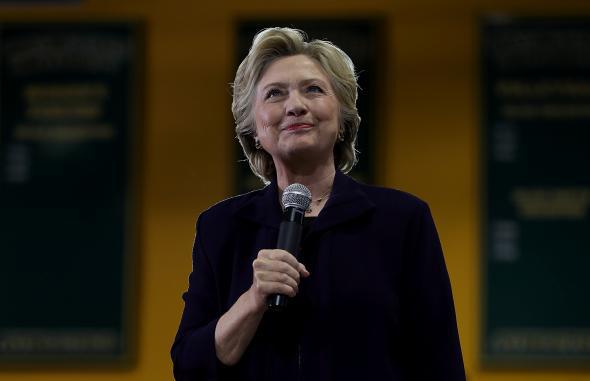Hillary Clinton’s latest email-related headache didn’t last long. The now-retired FBI official at the center of the “quid pro quo” controversy, which sparked to life on Monday, came forward on Tuesday to acknowledge that an offer to trade favors with a State Department counterpart originated with him—and that he quickly pulled the offer once he learned more.
In interviews with the Washington Post and the New York Times, Brian McCauley gave his version of events: In the spring of 2015, he had been trying for weeks to get someone at the State Department to approve his request to put two bureau employees back in the U.S. embassy in Baghdad, but was having no luck. So when Patrick F. Kennedy, an undersecretary at the State Department, called him up to talk about an unrelated matter, McCauley seized the opportunity. “He said: ‘Brian. Pat Kennedy. I need a favor,’” McCauley recalled to the Post. “I said: ‘Good, I need a favor. I need our people back in Baghdad.’ ” It was only then, said McCauley, that Kennedy explained what he wanted: the FBI to mark a particular email that had traveled through Clinton’s private email server as unclassified. More from the Times:
“I’m the one that threw that out there,” Mr. McCauley said of the offer. He said that he was concerned the two vacant posts posed a security risk at the embassy, and that the offer was typical of how federal agencies “help each other and work with each other.”
In that initial conversation, Mr. McCauley said, “it was a quid pro quo; I don’t deny it.” Mr. McCauley said he had quickly reversed himself, however, after calling another F.B.I. official and learning that the email in question involved the Benghazi attack — a political cudgel for Republicans against Mrs. Clinton.
At that point, Mr. McCauley said, he abandoned any thought of exchanging favors and called Mr. Kennedy immediately to tell him that he could not help. “It was off the table; the quid pro quo was not even close to being considered,” Mr. McCauley said.
The issue of potential favor-trading concerning the classification of Clinton’s emails first came to light on Monday when the FBI released its latest batch of files related to its since-completed investigation into whether Clinton and her aides mishandled sensitive government information that flowed through her private email server. The release—roughly 100 pages of summaries of interviews the FBI conducted during its probe—suggested there were strong disagreements between the FBI and the State Department last year over whether some of Clinton’s emails should be retroactively marked classified as the agencies prepared those messages for public consumption. It was the mention of a “quid pro quo” between Kennedy and McCauley—whose name had been redacted in the notes—that immediately drew the most attention, including accusations from Donald Trump and his fellow Republicans that the two agencies had colluded to protect Clinton. (“This is worse than Watergate,” said Trump.)
McCauley’s version of events lines up with the one offered by Kennedy, as well as with the general defense offered by the Obama administration—and the president himself—that this latest email-related frenzy was much ado about a rather run-of-the-mill inter-agency dynamic. The email in question—sent in November 2012 and concerning possible arrests related to the Benghazi attacks—was ultimately deemed classified by the FBI despite the State Department’s efforts, and a redacted version of it was released in May of last year. Neither Kennedy nor McCauley, then, got what they wanted. Furthermore, there’s never been any evidence that Clinton or her campaign was even aware of a discussion that took place between a career civil servant and an FBI employee, years after she left the State Department.
I wrote on Tuesday, before McCauley came forward, that what little we knew about this exchange over an email had little to do with Clinton herself. Now that McCauley and Kennedy have come forward, we know more—and there’s even less of a reason to suspect Clinton had any involvement in the entire affair.
Update Oct. 19, 12:31 p.m.: The Republican National Committee appears unconvinced by the new revelations and has formally requested that the State Department’s inspector general launch an investigation into matter.
